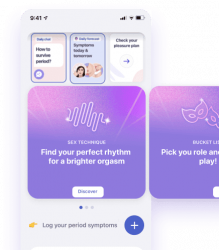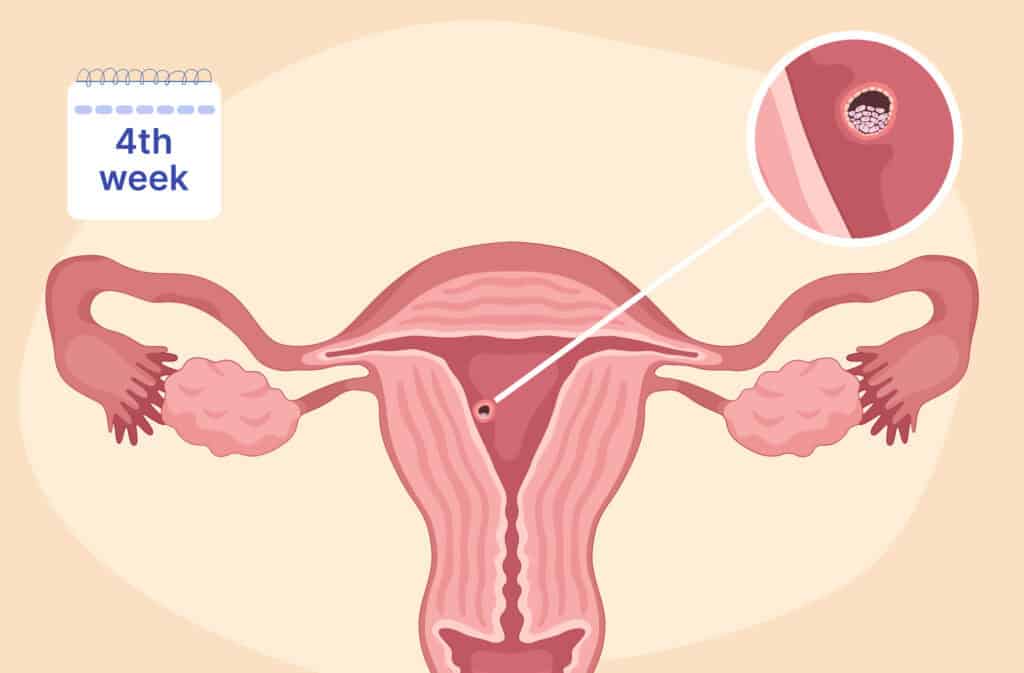Femia > Health Library > Your cycle > Health > Sex after miscarriage: When is it safe to resume intimacy?
Sex after miscarriage: When is it safe to resume intimacy?

- Updated Mar 2, 2025
- Published
CRAFTED BY HUMAN
Crafted by human At Femia, we provide accurate and up-to-date information at every stage of your journey, from trying to conceive, pregnancy and postnatal support. All content is created by a real person based on in-depth research and own professional experience. Femia ensures that you will receive expert advice, strict accuracy and a personalized approach from our authors/medical experts. Learn more about our editorial policy.
FACT CHECKED
Fact checked At Femia Health, we maintain the highest standards of editorial excellence in delivering content focused on helping you conceive, guiding you through pregnancy, and supporting you postpartum. Explore our content review principles to learn how we ensure the accuracy and quality of our health and lifestyle tips for every stage of your journey.
Medical experts don’t recommend rushing to try and conceive right after pregnancy loss. It is recommended to abstain from physical intimacy for about two weeks or more, depending on the circumstances.
Overwhelmed by feelings and emotions, some women can’t think about sexual activity following a pregnancy loss. However, when they heal physically and mentally after a miscarriage, they might start to wonder when it’s safe to resume sex.
This article will explain how long you should wait to have intercourse again after a miscarriage and when to get the green light from a healthcare provider.
How long should you wait to have sex after a miscarriage?
A miscarriage is a physical process with an emotional component commonly associated with feelings of anxiety, loss, and anger. It is completely normal for both partners to experience a wide range of emotions. Eventually, however, you’ll both feel ready to be intimate and perhaps try to get pregnant again.
So, how long after miscarriage can you have sex? There is no exact timeline, as miscarriages can happen for a wide variety of reasons with different impacts on your health. Emotionally, you may not feel ready even when you are physically healed. Whatever timeframe you choose to resume intimacy is completely valid.
Follow general guidelines
With the help of a healthcare provider, you can determine when you feel ready to have sexual intimacy regarding your physical and mental conditions.
Some women have a quick turnaround time and plan another pregnancy, while others are not ready to conceive again and need to wait a bit longer. Typically, it depends on the time that your pregnancy lasted before a miscarriage. The longer it lasted, the longer the recommended waiting period.
Depending on the time it happens, a miscarriage can be classified as being at:
- early stages (up to 8 weeks)
- first trimester (8–12 weeks)
- late stages (18–22 weeks)
The death of the fetus at 20 weeks requires complicated treatment and a longer restoration period. Allow your body to heal for at least 2–4 weeks, and wait until the healing process is complete. Consider visiting a doctor to determine that the treatment is no longer needed. In individual cases for women with complications, doctors may recommend waiting six weeks or more.

Check with your doctor
Before deciding to have sex again, it is best to have an appointment with your doctor and talk about your recovery process. Women feel and recover differently after a pregnancy loss, so doctors recommend a pelvic exam to ensure you are fully healed.
Medical experts advise couples not to rush and to abstain from penetrative sex for a couple of weeks to avoid possible physical complications. You can engage in sexual activity again when all symptoms of miscarriage (like bleeding, cramping, breast tenderness, and pain in the lower abdomen) have disappeared and your body is healthy.

Heal physically after a miscarriage
1. Let your uterus heal
After a miscarriage, the cervix dilates wider than normal, making it prone to infections and bacteria that can reach the internal structures of the reproductive system. So, doctors recommend not inserting anything into the vagina after a miscarriage, including douches, tampons, menstrual cups/discs, and anything penetrative, like fingers and sex toys.
When bleeding stops, the cervix will be closed again. Once it is closed, the risk of infections is reduced.
2. Wait until bleeding stops
After a miscarriage, a woman may bleed or have vaginal discharge as her body clears the uterus to prevent infections. The duration and amount of bleeding will depend on your pregnancy. The bleeding may last for a week or two when all the tissue passes, while light bleeding or spotting can last for 4–6 weeks. Your doctor will inform you about the expected timeline and provide tips to manage it. When miscarriage-related bleeding stops, you can safely resume sexual intimacy.
Emotional recovery and readiness
Even if your body is physically ready for sex after miscarriage, you may not be emotionally prepared for intimacy.
Most women feel a mixture of emotions and may find support and guidance by discussing the situation with a mental health counselor. It may help you to process your feelings, heal wounds of loss, enhance your coping skills, and ease your fears. You are not alone in this.
You may also turn to your family and friends for comfort and help, or join a support group of women who have been through the same experience. Doctors state that miscarriages can happen for various reasons (chromosomal abnormalities, infections, hormonal disorders, etc.) during conception, which is no one’s fault. You may feel depressed and worried but emotional support and self-care may help.
Some find that trying for another pregnancy brings hope and joy. However, healing is a personal process and can also occur through other forms of emotional support and self-care.
Give yourself time to grieve
It is normal not to want physical intimacy or to be touched after a miscarriage. You may need time to grieve. Take as much time as you need for emotional recovery.
Your family members and friends may help you process things easier. Also, you may consider visiting a counselor to talk about your feelings and seek appropriate care, especially if you notice depression signs. For example:
- eating too little or too much;
- having a lack of energy;
- being frustrated;
- feeling distressed, empty, or hopeless;
- sleeping too little or too much;
- being irritable;
- losing interest in most regular activities.
It’s normal to notice these symptoms in the first weeks after a pregnancy loss. If they are consistent, the doctor may suggest talk therapy or prescribe medication. Even if you don’t have post-miscarriage depression, therapy may help you process your grief. Besides, it will provide an opportunity to discuss the challenges of getting pregnant with the doctor (if you plan to conceive again).
Talk with your partner
Even if your partner is ready for intimacy, you may need more time to process your feelings and mentally recover. Talk to each other, and share the feelings hidden inside of you. It will help reduce conflict and confusion. Explain to them calmly that you need more time to process the loss of your baby and that they need to be patient.
When can you have sex after a D&C?
Doctors perform D&C (dilation and curettage) in situations when incomplete pregnancy loss (a missed miscarriage) has occurred. During an incomplete pregnancy loss, only some of the developing tissue passes, while the rest stays in the uterus. This procedure involves removing fetal tissue left behind following a miscarriage, especially if the pregnancy is advanced. Missed miscarriages may require more recovery time, especially later miscarriages, when the size of the fetus is larger.
Take as much time as you need, and wait until you are ready to have sex after D&C. Each woman has a specific healing timeline that is unique to them.
Typically, a woman can proceed with regular activities a day or two after a D&C procedure. The overall restoration period will depend on your health condition, symptoms, and other unique circumstances. Dr. Rebecca Cohen says that in individual cases, a woman may have complications and should seek medical attention right away if she notices:
- fever;
- chills;
- heavy bleeding;
- unpleasant smelling discharge;
- lasting dizziness;
- severe abdominal pain.
Call your doctor immediately if you have any of these symptoms.


Tips for safely resuming sex
Both partners need to support each other and talk about their feelings. Here are some tips that will help you resume sexual activity safely and establish close bonds.
Start slowly. Before you move on to full intercourse, try outercourse (sexual activity without exchanging body fluids). You may begin with gentle, non-penetrative intimacy. Besides, there are multiple ways to express intimacy without sex, like cuddling, hugging, dating, talking, etc.
Use lubrication. You can use lubrication to ease discomfort and diminish the risk of irritation.
Listen to your body. Monitor if you have any discomfort, pain, or bleeding during or after sexual intercourse. Consult your doctor if these symptoms persist.

Questions from a Femia community
What if I feel anxious about resuming sex after a miscarriage?
Miscarriage can cause feelings of anxiety, sadness, or guilt, which are absolutely normal. Talk to your partner, and share your feelings and emotions. Getting support from your relatives and friends may also help. You can also visit a mental health counselor and get professional advice on how to restore and solve your relationship problems.
Can having sex too soon after a miscarriage cause complications?
Yes, having sexual intimacy right after a miscarriage can lead to developing infections in the internal structures of your reproductive system and cause complications. Inserting anything into the vagina during the healing process is not recommended.
When will my period return after a miscarriage or D&C?
Women can expect their first period a few weeks to a couple of months after a miscarriage. The exact timing varies depending on the level of hCG hormone that was produced by the placenta during pregnancy to support the growing embryo. Your menstrual cycle will return to normal when the level of this hormone is zero again.
Can I get pregnant immediately after a miscarriage or D&C?
Women can ovulate and get pregnant as soon as two weeks after a miscarriage. However, it is better to have a sense of timing and wait at least one menstrual cycle until your body is completely restored before the next pregnancy. Talk to your healthcare provider about appropriate methods of contraception, or discuss family planning if you feel prepared to conceive again.
What should I do if I experience pain during sex after a miscarriage?
After a miscarriage, a woman may feel pain in her vaginal area. Having sexual intercourse at this time may cause discomfort and result in infection. The best way to prevent this is to wait for complete recovery before having sex again, and consult your healthcare provider if pain persists.
The bottom line
Pregnancy loss is a traumatic event that requires time to heal before you can resume sexual activity. Make sure you have no post-miscarriage symptoms, and take time for your emotional recovery. Even if your body is ready for intimacy, it doesn’t mean that you are, which is absolutely normal. Take things at their own pace, and don’t feel pressured to have sex.
References
- “Early Pregnancy Loss.” ACOG, https://www.acog.org/clinical/clinical-guidance/practice-bulletin/articles/2018/11/early-pregnancy-loss.
- Dulay, A. T. “Stillbirth.” MSD Manual Professional Edition, 6 Mar. 2024, https://www.msdmanuals.com/en-gb/professional/gynecology-and-obstetrics/antenatal-complications/stillbirth?autoredirectid=23514.
- Dauffenbach, H. “How Soon Can Couples Have Sex Again After a Miscarriage?” ISSM, 5 May 2015, https://www.issm.info/sexual-health-qa/how-soon-can-couples-have-sex-again-after-a-miscarriage/.
- “Symptoms.” NHS.uk, 1 Apr. 2022, https://www.nhs.uk/conditions/miscarriage/symptoms/.
- “First Trimester Bleeding: Evaluation and Management.” PubMed, 1 Feb. 2019, https://pubmed.ncbi.nlm.nih.gov/30702252.
- “Miscarriage – Symptoms and Causes.” Mayo Clinic, 8 Sept. 2023, https://www.mayoclinic.org/diseases-conditions/pregnancy-loss-miscarriage/symptoms-causes/syc-20354298.
- DeFrain, J., Millspaugh, E., and Xie, X. “The Psychosocial Effects of Miscarriage: Implications for Health Professionals.” Families Systems & Health, vol. 14, no. 3, 1996, pp. 331–347. https://doi.org/10.1037/h0089794.
- Cooper, D. B., and Menefee, G. W. “Dilation and Curettage.” StatPearls – NCBI Bookshelf, 7 May 2023, https://www.ncbi.nlm.nih.gov/books/NBK568791/.
- “What Happens After a Miscarriage? An Ob-Gyn Discusses the Options.” ACOG, https://www.acog.org/womens-health/experts-and-stories/the-latest/what-happens-after-a-miscarriage-an-ob-gyn-discusses-the-options.

Learn about week 4 pregnancy symptoms, baby size, and the changes happening in your body as you progress in early pregnancy.

Wondering if sushi is safe during pregnancy? Learn why raw fish should be avoided and discover pregnancy-safe sushi options, including cooked and vegetarian rolls.

Learn about common signs and symptoms of hormone imbalance after pregnancy, why it happens, and how to support your body’s recovery.

